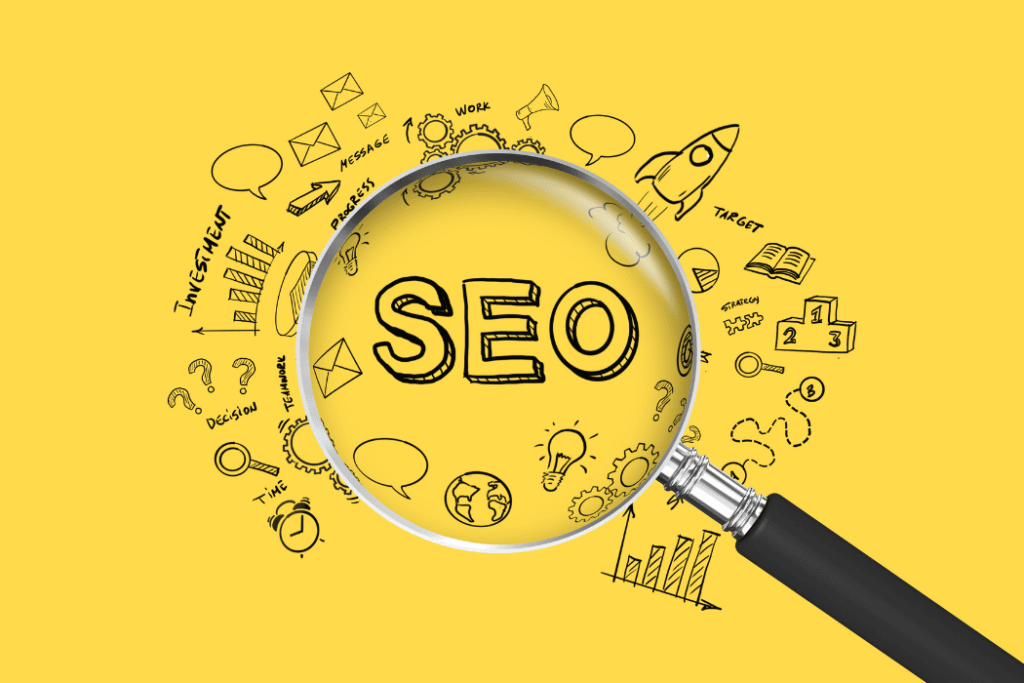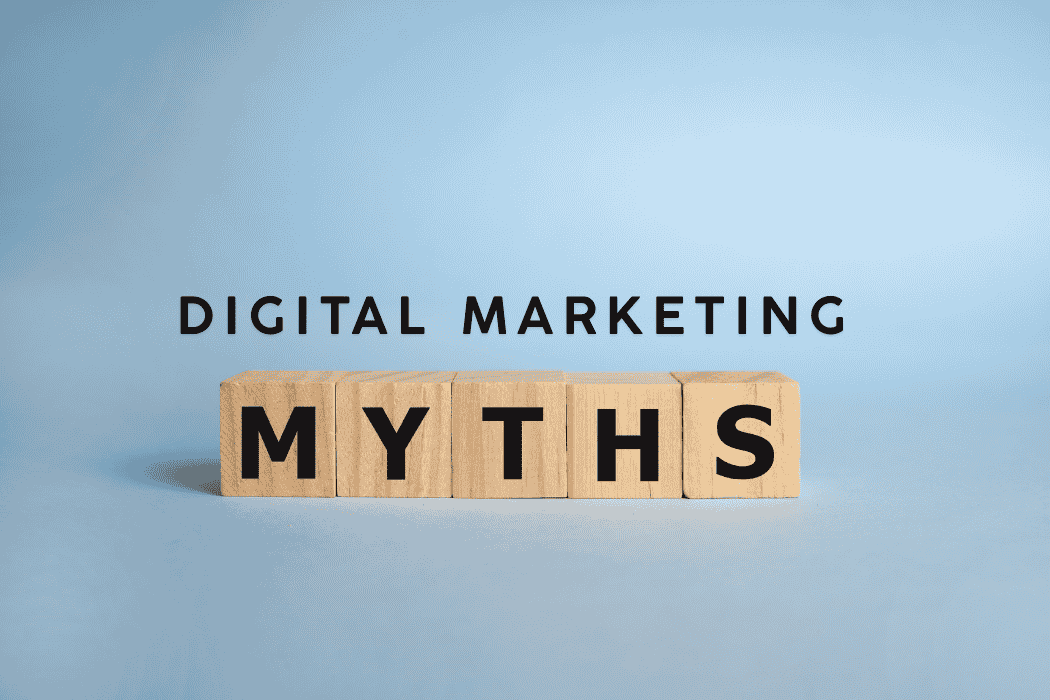In the ever-evolving world of digital marketing, it’s not uncommon to come across a few digital marketing myths and misconceptions that can throw businesses off track. These misleading beliefs can hinder your marketing efforts and prevent you from reaching your goals. So, it’s essential to separate fact from fiction and debunk some of the most common digital marketing myths. In this article, we have debunked some of the most common digital marketing myths and misconceptions. We have seen that digital marketing is not exclusive to big businesses and can be accessible and beneficial for businesses of all sizes.
Table of Contents
Myth #1: Digital marketing is only for big businesses
This myth stems from the perception that digital marketing requires significant financial investments that only big businesses can afford. However, digital marketing encompasses many tactics and strategies, many of which can be executed on a shoestring budget. For example, social media marketing allows businesses to reach their target audience organically by creating engaging content and leveraging user-generated content. Additionally, email marketing is a cost-effective way to nurture leads and drive conversions.
Furthermore, digital marketing provides SMEs with valuable analytics and data insights that can inform their marketing strategies and drive more targeted campaigns. With tools like Google Analytics and social media analytics platforms, businesses can track their online performance, identify areas for improvement, and optimize their marketing efforts. In summary, digital marketing is not exclusive to big businesses. SMEs can benefit from digital marketing by leveraging cost-effective tactics, data analytics, and targeted strategies.
Myth #2: SEO is dead

Search Engine Optimization (SEO) is often misunderstood or considered outdated by some. However, SEO remains a critical component of any successful digital marketing strategy. While search engine algorithms have evolved, the importance of optimizing your website for search engines has remained the same. SEO helps businesses improve their online visibility and organic search rankings. By optimizing your website’s content, meta tags, and backlink profile, you can increase your chances of appearing on the first page of search engine results.
This, in turn, drives more organic traffic to your website and increases the likelihood of conversions. It’s important to note that SEO is an ongoing process that requires continuous monitoring and adjustments. Search engine algorithms constantly change, and staying up-to-date with the latest best practices is crucial. Investing in SEO can yield long-term benefits for your business by driving consistent organic traffic and improving your online presence. In conclusion, SEO is far from dead. It remains an essential aspect of digital marketing. Businesses must improve their visibility and attract organic traffic.
Myth #3: Social media marketing is enough for online success
While social media marketing is a powerful tool for building brand awareness and engaging with your audience, more than just social media is needed for online success. Social media platforms constantly evolve, and algorithm changes can significantly impact a business’s reach and visibility. Therefore, it’s essential to diversify your digital marketing efforts and not rely solely on one channel.
A comprehensive digital marketing strategy should include a mix of tactics, including search engine optimization (SEO), content marketing, email marketing, and paid advertising. This multi-channel approach allows businesses to reach their target audience through different touchpoints and increase their chances of conversion. Additionally, social media platforms are primarily designed for engagement and brand awareness. Still, then there may be more effective channels for driving direct sales. Incorporating other tactics into your digital marketing strategy allows you to create a holistic approach that maximizes your online success. In summary, while social media marketing is valuable, it should be part of a broader digital marketing strategy that includes various channels to ensure online success.
Myth #4: Email marketing is dead

With the rise of social media and other digital marketing channels, some believe email marketing is no longer effective. However, email marketing remains one of the most powerful tools for nurturing leads, building customer relationships, and driving conversions.
Email marketing allows businesses to communicate directly with their audience, delivering personalized and targeted messages. By segmenting your email list based on customer preferences, demographics, or behaviour, you can tailor your messages to specific segments, increasing the chances of engagement and conversions. Moreover, email marketing automation tools enable businesses to set up automated workflows that deliver relevant content to subscribers at specific times. This automation saves time and ensures your audience receives timely, personalized communications. In conclusion, email marketing is far from dead. It continues to be an effective channel for businesses to communicate with their audience, nurture leads, and drive conversions.
Myth #5: Content marketing is too time-consuming
Content marketing is often perceived as time-consuming and resource-intensive. However, the benefits of content marketing far outweigh the investment required. Content marketing allows businesses to establish thought leadership, build trust with their audience, and attract organic traffic.
While creating high-quality content does require time and effort, it’s essential to remember that content can be repurposed and distributed across various channels. For example, a blog post can be repurposed into social media content, an email newsletter, or even a video. Businesses can maximize their efforts and reach a wider audience by repurposing content. Additionally, outsourcing content creation to freelance writers or agencies can alleviate the time burden for businesses with limited resources. These professionals can create high-quality content that aligns with your brand and resonates with your target audience. In summary, while content marketing requires time and resources, the benefits of building thought leadership, attracting organic traffic, and establishing trust make it worthwhile for businesses.
Myth #6: Paid advertising is a waste of money
Some businesses believe paid advertising is too expensive and yields insignificant results. However, paid advertising can be a highly effective way to reach a targeted audience, drive traffic, and generate leads. Platforms like Google Ads and social media advertising allow businesses to target specific demographics, interests, and behaviours, ensuring that the right people see their ads.
Additionally, paid advertising provides valuable data insights and analytics that can help optimize campaigns and improve ROI. It’s important to note that a well-executed paid advertising strategy requires careful planning, monitoring, and optimization. Businesses should set clear goals, define their target audience, and continuously evaluate and adjust their campaigns to maximize results. In conclusion, when executed strategically, paid advertising is a good use of money. It allows businesses to reach a targeted audience and generate leads, provided campaigns are appropriately planned and optimized.
Myth #7: Digital marketing is a one-time effort
The belief that digital marketing is a one-time effort is a common misconception that can hinder a business’s success online. Digital marketing is an ongoing process that requires consistent effort and adaptation to stay ahead of the competition.
Digital marketing strategies must be continuously reviewed, refined, and optimized based on data and performance insights. Algorithms change, consumer behaviours evolve, and new trends emerge. To remain relevant and practical, businesses must stay up-to-date with the latest industry developments and adjust their strategies accordingly. Moreover, digital marketing requires regular content creation, social media management, and customer engagement. Consistency is critical to building a solid online presence and connecting with your target audience. In summary, digital marketing is not a one-time effort but an ongoing process that requires consistent effort, adaptation, and staying up-to-date with industry trends.
Myth #8: Digital marketing is too expensive

The belief that digital marketing is too expensive is another common myth that can deter businesses from investing in their online presence. While some digital marketing tactics may require a financial investment, there are cost-effective strategies that can yield excellent results.
For example, social media marketing allows businesses to reach their audience organically through engaging content and user-generated content. Email marketing is another cost-effective tactic that enables companies to nurture leads and drive conversions. Additionally, when repurposed and distributed effectively, content marketing can maximize the return on investment. Furthermore, digital marketing provides businesses with valuable data insights and analytics, allowing them to optimize their campaigns and allocate resources more efficiently. In conclusion, while digital marketing may require some financial investment, there are cost-effective strategies that can yield significant results. By carefully planning and utilizing the right tactics, businesses can achieve their marketing objectives without breaking the bank.
Busting digital marketing myths
One prevalent misconception is that digital marketing is only for big businesses. Many small and medium-sized enterprises (SMEs) believe they need more resources or expertise to compete in the digital realm. However, this couldn’t be further from the truth. Digital marketing offers numerous opportunities for businesses of all sizes to reach their target audience, build brand awareness, and drive conversions. With the right strategies and a solid understanding of digital marketing principles, SMEs can level the playing field and compete with larger competitors. SEO is far from dead and remains a crucial aspect of digital marketing.
Social media is just one piece of the digital marketing puzzle, and businesses should explore other channels to maximize their reach and engagement. Email marketing is still a powerful tool for connecting with the audience and driving conversions. Digital marketing is not necessarily expensive and can offer a higher ROI compared to traditional advertising. Quality content is essential for digital marketing success, and businesses should prioritize creating valuable content that resonates with their audience. Finally, digital marketing is a long-term strategy that requires patience and consistent effort to achieve significant results. By busting these myths, businesses can make informed decisions and navigate the digital marketing landscape more effectively.
Strategies for success in digital marketing
To navigate the digital marketing landscape successfully, it’s crucial to debunk these myths and implement strategies that drive results. Here are some critical strategies for success:
- Develop a comprehensive digital marketing strategy: Outline your goals, target audience, and desired outcomes. This will guide your efforts and ensure a consistent approach across different channels.
- Leverage a multi-channel approach: Don’t rely solely on one digital marketing channel. Instead, diversify your efforts to reach your audience through various touchpoints.
- Stay up-to-date with industry trends: Digital marketing is constantly evolving, so it’s essential to stay informed about the latest trends, technologies, and best practices.
- Monitor and measure your efforts: Regularly review your data and analytics to assess the performance of your campaigns. Use these insights to make data-driven decisions and optimize your strategies.
- Experiment and iterate: Digital marketing is not a one-size-fits-all approach. Experiment with different tactics, test and iterate to find what works best for your business.
Conclusion
By understanding and dispelling these myths, businesses can confidently navigate the digital marketing landscape and make informed decisions to achieve their marketing objectives. Digital marketing offers numerous opportunities for businesses of all sizes to reach their target audience, build brand awareness, and drive conversions. By leveraging a multi-channel approach, staying up-to-date with industry trends, and implementing data-driven strategies, businesses can unlock the full potential of digital marketing and propel their success in the online world. So, debunk these myths, embrace digital marketing, and watch your business thrive in the digital age.






